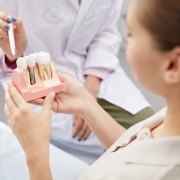The Dangers of DIY Tooth Extraction
You notice one of your teeth is severely loose—should you pull it yourself? No matter how loose a permanent tooth may be, you are much better off to trust tooth extraction in Owensboro to a qualified dentist. Here is a look at some of the things that can go wrong with a DIY tooth extraction.
Severe Pain
Tooth extraction can be painful. You are essentially ripping the tooth away from the soft connective tissue that supports it. Even a tooth that is really loose can have bits of connective tissue still in place. This is why dentists inject a local anesthetic to numb the nerves in the area and keep you comfortable throughout the procedure.
Nerve Damage
The mouth, gums, and jaws are filled with important nerves. Trigeminal nerves that lie near the teeth can actually be connected to multiple other points, such as the lips, gums, and chin. Damage to these nerves during extraction can bring about severe side effects, such as changes in speech or constant electrical pulse sensations. If you don’t know where these nerves are located, you could easily damage them during a DIY attempt to pull a permanent tooth.
Damage to Surrounding Teeth
When your tooth is pulled by a dentist, they do x-rays and thorough examinations to get familiar with the shape of your jaws and the positions of the surrounding teeth. They do this to make sure they can dislodge the existing tooth safely without causing damage to any of the surrounding teeth. When you attempt to pull a tooth on your own, you could easily cause permanent damage to the teeth that surround the area.
Work with an Owensboro Dentist to Have a Tooth Pulled
While teeth extractions are a highly routine dental procedure, this is a procedure that should be trusted to an Owensboro dentist. If you have a tooth that you suspect should be pulled, please reach out to us at the office of Dr. Travis Wilson DMD to schedule an appointment.










